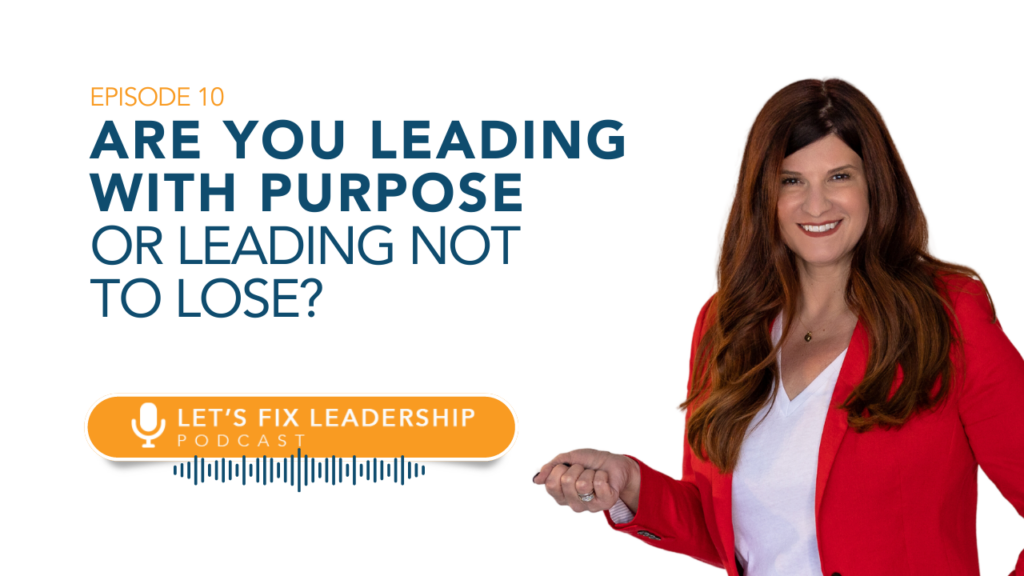0:00:00.1 S2: Here's the question of the day, are you playing towards purpose or are you playing not to lose...
0:00:09.6 S1: Welcome back, friends, this is your place or cutting edge tools, exercises, best practices and modern leadership strategies, because in the world is changing, it's time to bring our leadership styles along for the right, whether you're a company leader, a corporate visionary and entrepreneur. This show gives you new insights into the neuroscience and a language and leadership, plus practical steps and tips to lead your teams and caraway, but also help you keep your people happy and engaged all while achieving your biggest goals. I'm your host, gender, I'm a talent strategist, a brain-based executive coach, speaker, and the founder of three of our coaching. Now, let's fix leadership. Do you have an idea or a topic we should discuss here together on let's fix leadership, send your ideas and your questions directly to me at... Hello, at fix leadership dot com.
0:01:06.9 S2: There are two ways to lead. One of those is leading towards purpose, towards vision, towards something, and then other people lead not to lose, and that may sound like no one play or no one leads or plays not to lose, but as we go through the episode today, I think you'll start to see how often we actually lead... Or play, not to lose. So what does the difference look like? So when we lead towards purpose, we understand why we're doing something, we understand the mission, we understand that some days will be good, some days will be tough, some days will be fan for fantastic, some days are just those days you have to work through, but when we're leading with purpose, we lead as if we're in control, we lead as if we have the ability to influence the mission of the organization, we have the ability to influence others, we are impacting the world around us, then those who are playing not to lose or leading, not to lose... Their mind works a little different. Everything is happening to them. So they protect themselves, they really want to make sure that they don't get in trouble, and we play not lose for a lot of reasons, it could be the way we're being led, it could be some fear we have, it could be all kinds of things, but unfortunately more times than not, we are leading not to lose, and when we think about the business, what happens to the business and we play not to lose, well, we start protecting ourselves, so that could be thrown others under the bus that could be setting someone up for failure that could be not helping someone, we could start distancing ourselves from others, from our team, from our supervisor, from on the mission.
0:03:01.9 S2: We might fall into perfectionism, and that's really common when we're playing not to lose, perfectionism shows up, and often times when we're playing not to lose or micro-managing people, because again, we want nothing to go wrong. Everything has to be perfect. We have to check the boxes. And it sounds like a couple of different things when you're playing not to lose, it can sound like someone saying, I'm just gonna keep my head down and just do what I'm told, and I think all of us have done that at least once in our career, it might sound like someone saying, You know, I'm not gonna bring that up, or why... Say anything, no one wants to hear it. It doesn't matter, we're just gonna do what we're told... Oftentimes, I might, when I'm coaching, say things like, they're the boss, I'm just gonna do what I'm told, I don't question it anymore. All of those things are protecting ourselves, it's listing ourselves, it's making us lead not to lose... Now, let's kind of flip the script on that, what if we were leaving for a purpose, what does that do for the business... Well, obviously, if we're leading towards purpose and where an influencer, we're in control, we're gonna be more innovative, we're gonna take more risk, we're gonna understand the reason why and share that every day and work towards it, we're gonna be more open-minded, we're gonna feel more connected and ultimately, we're gonna be more confident because we know what we're going for, we know we are in control and we know we have the power to influence and drive something forward, and...
0:04:38.2 S2: What does that sound like? It could sound something like, I know this is difficult, but we will make a difference. We will figure this out. What ideas do you have? It's okay if no one else believes in us because we believe in ourselves, what about maybe something like, give it a try. And let's just see how it works. All of those types of statements tell you that someone is leading with purpose, they know where they're going, they know they have the ability to influence, they're not living in this fear of messing up, this fear of failure, this fear of not doing anything. They're not staying in the past because it more perfectionism, and we're distancing ourselves and we're protecting... We typically are staying in a very safe zone, but again, when we're saying things like, I know this is difficult, but we will make a difference or were the first ones out in the market, and we might get some hackers out there, but we're gonna make a difference and you'll see, we got out of there first, and you just see how those two sets of languages really start to tell you if someone is leading towards a purpose or someone leading not to lose.
0:05:56.2 S1: Let's take a quick break from the conversation, do you have new leaders on your team and you can see their potential, you can see their runway, but you can not figure out how to get them across the Penistone reach out to three or four coaching and learn more about our brain-based competency-focused executive coaching. So
0:06:16.8 S2: When you think about that, so what... Now, what do you do with this information? And really, what's important here is, how do you know if you are leading with purpose or are you leading not to lose?
0:06:28.0 S1: So I want you to start listening to yourself.
0:06:29.7 S2: And I give that advice all the time, we have to be witnesses to our own language, because that language gives us an idea of what's going on in our inner game, and the inner game is so important, especially at that higher level executive level, it's no longer about skill sets, it's all about our thoughts, it's about that in our game, and to listen to yourself, are you using protective language or are you using language that's daring and exciting and innovative and pushing things. What are you thinking inside your head, is It protective or daring? And then listen to yourself, talk to your peers, listen to yourself, talk to your team, all of those conversations need to be leaning towards purpose-language, because if you're telling your peers one set of narratives and that could be around protecting or distancing, but you're trying to tell your team, something else. It's not gonna come together. Everything has to be towards purpose, the other good practice is to listen to those around you and listen to them talk, are they talking and protective language or are they talking in language towards purpose. And depending on who that is, you could really help them out if that's a peer, it's so easy to jump on their bandwagon and start leading not to lose with them using language that is protective or perfectionism or micro-managing, but you can also make the decision to change the narrative with that peer and help them through it, help them start to see, Hey, I understand it's tough, but this is why we're doing it, what can we do to make today feel a little bit more of influence and so much about...
0:08:21.6 S2: Victim so much about it happening to you. And when you start to think about your language, the language of others, the next thing you wanna start to do is ask yourself if you're in protective mode, if you are leading not to lose, whether it's in certain situations or across the board, you have to start asking yourself, Why is that? It is gonna be important for you to know, is it the relationship you have with your supervisor, then you need to have a conversation with them, is it... Your balance is off and you need to find better balance and you need to start having some conversations around that, you've got to dig down and find the root cause of why you are leading not to lose because that root cause is something you can work with, it's something you can do something with and say, Hey, here's a conversation I could have, maybe I need to make some changes on my team, maybe I need to just make some changes in my own inner game. Maybe I need to talk to a peer, I want you to talk to a coach. I might need to have a difficult conversation with a cross-functional business partner that is difficult for me to work with, no one knows what your root causes, but when you know your root cause, you have all the power in the world to do something about it.
0:09:42.8 S2: So again, it's about understanding your own inner game, understanding are you leading with purpose because it has so much positive impact on the business, or are you leading not to lose and playing not to lose, and knowing when you do that, every day you do that, there's a negative impact on your team, your peers, your business, there's a negative impact on all types of things, but you as a human, gets wake up every day and make a decision for yourself, and I hope today you go out there and you lead with purpose, you use innovative and risk taking and daring language, because my friends, if you wanna fix leadership, you've got to lead with purpose.
0:10:31.2 S1: Thanks for listening to Les Bigler ship. By hanging out with me today, you're already on your path, if you're looking to learn more and to see if your company is a good fit for our coaching and leadership education, and Hey, visit 3042 dotcom if you got value on the podcast. Share it with a friend, and it would mean the world to... If you leave a bottle review and a rating on it, thanks again for listening, and I appreciate your work and fixing leadership.




